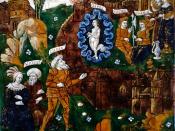Aeneas' first speech in comparison to this later speech to his comrades shows a sharp contradiction in his own words. While overwhelmed with grief, Aeneas groans to the stars and cries out in solitude; "O three and four times blessed were those who died before their fathers' eyes beneath the walls of Troy" (1:132-135). Aeneas' views his survival as cowardice, stating those who died at Troy died with honor and for a great cause; those who gave their lives paid the ultimate sacrifice in braving death. Aeneas' proceeds in measuring himself to much greater men, such as Hector, who died at the hands of the worthy adversary, Achilles. Aeneas' states, "why did your right hand not spill my lifeblood" (1:136-137) which could be interpreted as, why did you withhold from me this honor? Aeneas' wish is to lie amongst the dead at Troy. However, in his later speech Aeneas' either portrays himself as a hypocrite or a changed man.
He encourages his comrades' weary hearts by stating: "we who have suffered things heavier than this - our god will give and end to this as well" (1: 277-278).
While Aeneas' men fall into a similar dispar Aeneas experienced earlier, Aeneas, who was nearly defeated by his sorrow at Troy, now views his sorrow as a source of strength. He explains to his men that they have encountered disaster before, and encourages them that the obstacle before them is no different than the one they face now. Aeneas tells his men to welcome adversity in stating: "perhaps one day you will remember even these our adversities with pleasure" (1:286-287). Sorrow therefore breaks down the individual to rebuild him stronger than before. The speeches reveal Aeneas with two personalities. Alone, Aeneas appears to be vulnerable and weak to sorrow, but in the act of leadership he is portrayed as the hero, who encourages his men and confronts adversity.



